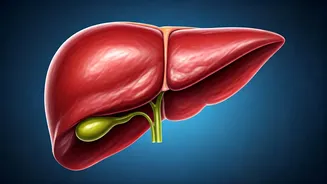Understanding Fatty Liver
Fatty liver disease, or hepatic steatosis, represents an accumulation of fat in the liver cells. This condition often stems from factors like obesity,
excessive alcohol consumption, and metabolic disorders. It's crucial to understand the different types, including non-alcoholic fatty liver disease (NAFLD) and alcoholic fatty liver disease (AFLD). NAFLD is linked to lifestyle choices, particularly diet and exercise, while AFLD is primarily related to alcohol intake. The disease progression can range from simple steatosis to more severe stages like non-alcoholic steatohepatitis (NASH), fibrosis, and cirrhosis. Early detection and intervention, often through lifestyle changes such as diet and exercise, are essential for preventing the condition from worsening and improving liver health. This proactive approach helps mitigate the risks of long-term complications and promotes overall well-being.
Dietary Intervention Steps
The cornerstone of managing and reversing fatty liver is dietary modifications. A key strategy is reducing the intake of processed foods, sugary drinks, and saturated fats. These can exacerbate liver fat accumulation. Focusing on a diet rich in whole foods, like fruits, vegetables, lean proteins, and whole grains, is vital. Incorporating foods high in antioxidants, such as berries and leafy greens, helps protect liver cells from damage. It is also important to control portion sizes to avoid overeating. For example, replacing sugary beverages with water or unsweetened tea significantly reduces sugar intake, which helps to mitigate the burden on the liver. Making gradual changes to eating habits and opting for balanced meals helps the process more sustainable and effective, promoting long-term health benefits for individuals. The integration of healthy cooking methods is also crucial, promoting consumption of nutrient-rich food and aiding in maintaining liver health.
The 38-Year-Old's Journey
A 38-year-old marketing executive found that through dedicated changes to her eating habits, she successfully improved her condition. She made deliberate adjustments such as minimizing processed foods and replacing them with whole foods. The focus on balanced meals and portion control were other strategies she implemented. The executive prioritized foods high in fiber and low in sugar and fat. This strategic focus significantly reduced the fat deposits in her liver. This journey shows that with committed effort and a well-planned approach, individuals can see marked improvements in their liver health. Through these dietary adjustments, she demonstrated that it is possible to reverse fatty liver disease without resorting to extreme dieting methods. Her personal experience serves as a clear illustration of how targeted dietary modifications can produce impactful health outcomes.
Foods to Prioritize
Several food groups play a significant role in improving liver health. Fruits and vegetables are rich in antioxidants, which safeguard the liver cells from damage. Lean protein sources, such as fish and poultry, help in maintaining liver function. Whole grains provide sustained energy and support metabolic health. Limiting saturated fats, commonly found in red meat and fried foods, also helps minimize fat accumulation. Incorporating foods like nuts and seeds, which have healthy fats, can be beneficial in moderation. The Mediterranean diet, with its focus on fresh produce, whole grains, and healthy fats, often proves effective. The inclusion of high-fiber foods also helps regulate blood sugar levels and promotes overall well-being. Focusing on a balanced intake of nutrients supports the liver's natural ability to detoxify and regenerate, creating a favourable environment for healing and recovery.
Lifestyle Considerations
Dietary changes work best in combination with other lifestyle adjustments. Regular physical activity supports weight management and improves metabolic function. This can help to reduce fat accumulation in the liver. Moderate exercise enhances the overall health and effectiveness of dietary interventions. Reducing or eliminating alcohol consumption is vital, particularly for those with AFLD. It is important to stay hydrated by drinking plenty of water, as it supports liver functions. Stress management techniques, such as meditation or yoga, can aid in reducing inflammation and promoting overall health. Prioritizing quality sleep further supports the body's natural healing processes. These holistic approaches work synergistically, optimizing the effectiveness of dietary changes and leading to improved liver health. By integrating these strategies, individuals can create an environment conducive to lasting health improvements and improved well-being.






















